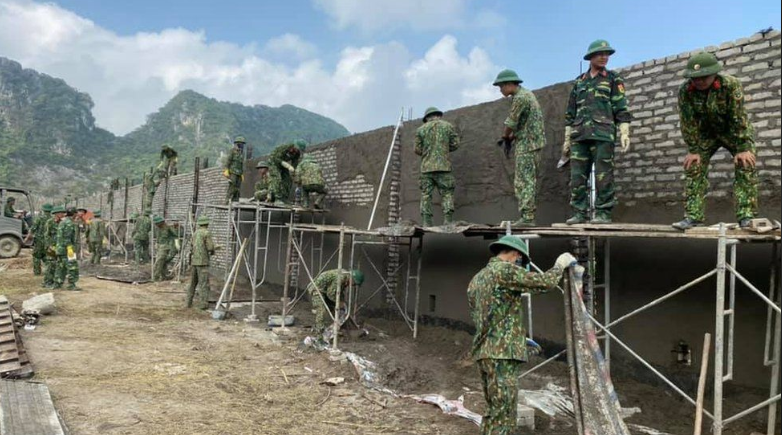Three Vietnamese policemen who died during clashes over a land rights dispute have been buried with honours in Hanoi.
Their deaths came during a massive security operation last week in a village near the capital, in which a local leader also died.
Villagers had been resisting attempts by the military to build an airfield on their land for several years.
Land disputes are common in Vietnam, but rarely escalate into such conflict.
The raid and the unexplained death of the popular local leader, 84-year-old Le Dinh Kinh, have caused huge public controversy.
The government has blamed the officers’ deaths on “rioters”, but locals say police used excessive force.
President Nguyen Phu Trong posthumously decorated the officers, while Prime Minister Nguyen Xuan Phuc attended the funeral in Hanoi on Thursday, saying they “sacrificed their lives to protect the national security”.
What is the dispute in Dong Tam?
The military began building an airport at Mieu Mon, close to Dong Tam, about three years ago.
Local people say that in the process, about 50 hectares (124 acres) of their land was unfairly taken over and handed to Viettel Group, Vietnam’s military-run communications company.
All land in communist Vietnam is owned by the state, so the government can technically use what it wants for military or civilian purposes. But locals say they have farmed the land for generations and were not being properly compensated.
Dong Tam first hit national headlines in 2017, when four people were arrested for “disturbing public order” in protests against the acquisition of the land.
Villagers retaliated by holding 38 officials, including police officers, inside a community house, for about a week. They were eventually released after the authorities agreed some concessions.
What happened in the 9 January clashes?
Villagers told BBC News Vietnamese that early that morning, up to 3,000 security personnel turned up.
“A lot of government people in mobile police uniforms, carrying sticks, clubs, clubs, guns, shields, rushed to the village,” said one woman who asked to remain anonymous, fearing retribution. Another witness said the police “threw flares, fired tear gas, blocked every corner, beat up women and the elderly”.
In a statement, the Ministry of Public Security said police had been sent to protect the public from protesters and to help the army build the boundary wall, a couple of kilometres away.
Construction of the wall annexing disputed land to the airfield was due to reach the edge of Dong Tam rural commune that day.
As workers began building the wall “some people resisted, using hand grenades, petrol bombs and knives to attack police forces, fighting officers on duty and disrupting public order”, the statement said, according to VNExpress.
Le Dinh Kinh was a Communist Party member and retired local official. But in recent years he had become an unlikely opponent of the government.
He was leading a group of local people who had sworn to sacrifice their lives to defend the land. He had been detained – and allegedly beaten by police – during the 2017 clashes.
According to the security ministry, three police officers who entered the village – Col Nguyen Huy Thinh, Cpt Nguyen Cong Huy and Lt Duong Duc Hoang Quan – came under attack. They died after being set on fire.
Local authorities said Mr Kinh was found dead inside a house holding a grenade.
His family and supporters dispute this. They say a widely circulated video of his body shows apparent bullet wounds. His son, Le Dinh Chuc, was injured in the raid.
Deputy Minister Luong Tam Quang said police had seized petrol bombs, iron rods and other weapons. Twenty people are being investigated on murder charges.
On 13 January, three of Mr Kinh’s family appeared on TV, with bruised faces, apparently admitting to possessing homemade weapons and petrol bombs. Rights groups have said these were forced confessions.
Mr Kinh’s wife, Du Thi Thanh, also says she was beaten by police.
What’s the response been?
The government and state-run media have painted Mr Kinh and the villagers as rioters and terrorists and the police officers as martyrs.
Coverage of the clashes on social media has been swamped by pro-government comment, while the government has demanded videos, articles and comments criticising the police operation be taken down.



